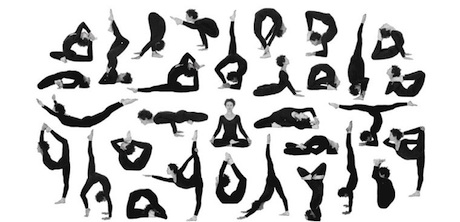It can be seen as obnoxious to write in a public forum about one’s yoga practice. I get it. I do. But I’m going to do it anyway, in the interest of doing some craft work about portmanteaux. Here goes:
On the first day of National Poetry Month, I went to a yoga class led by my favorite Shambhava yoga teacher here in Chicago and she taught us a new word: “thutt.”
Giving credit where it’s due, she told us she learned it by way of local Iyengar teacher Gabriel Halpern who mentioned it to help his students understand a muscle group at the intersection of the thigh and the butt.
The thrill of suddenly knowing that there is a word for that made me feel high. It’s so perfect and useful, like brunch, smog, spork, Spanglish, turducken, motel or carjack. In practical terms, it really did help me attain a better engagement for the posture (high lunge, if you’re curious).
But the real pleasure of “thutt” came from the from the sensation of having my active vocabulary not only expanded but concretely anchored to the world at a point that it hadn’t been before. And maybe because it was the first day of National Poetry Month, “thutt” made me think that the ecstasy I felt at hearing it probably has a lot to do with why some people are readers and writers—and particularly poets—and why other people aren’t. “Thutt” made me think (still in high lunge) of Auden, and how he says in “Writing” that “It is both the glory and the shame of poetry that its medium is not its private property, that a poet cannot invent his words and that words are products, not of nature, but of a human society which uses them for a thousand different purposes.”
I had to suppress those thoughts because I was starting to lose my balance, and because at the beginning of class we’d done a common meditation exercise: imagining a huge cardboard box and packing it with all the stuff we’d been thinking about before class and would start thinking about again after—our planning and scheming for the rest of the day, the week, the month, the year. So I packed the portmanteau into my box, and I pulled it out again after class, and now I am giving it to you: “thutt.”
Will my talking about yoga seem less obnoxious if I bring Shakespeare—himself a master of coinages—into it? There’s a part in Act 5 of A Midsummer Night’s Dream where Theseus says , “The lunatic, the lover, and the poet, / Are of imagination all compact,” and explains that “The poet’s eye, in fine frenzy rolling, / Doth glance from heaven to earth, from earth to heaven; / And, as imagination bodies forth / The forms of things unknown, the poet’s pen / Turns them to shapes, and gives to airy nothing / A local habitation and a name.”
And that function of poetry—giving embodiment to heretofore abstract concepts—is what gave me such a rush on learning the word “thutt.” In fact, there may even be a term for that sensation. If not, maybe one should be invented. Suggestions?
Also: What do other Harriet bloggers and poets make of Auden’s aphorism that: “In modern societies where language is continually being debased and reduced to nonspeech, the poet is in constant danger of having his ear corrupted, a danger to which the painter and the composer, whose media are their private property, are not exposed?” Does it trouble you that “however esoteric a poem may be, the fact that all its words have meanings which can be looked up in a dictionary makes it testify to the existence of other people?” Or do you like that?
Kathleen Rooney is a founding editor of Rose Metal Press, a publisher of literary work in hybrid genres…
Read Full Biography


